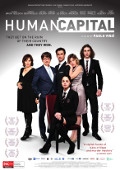
Italy 2013
Directed by
Paolo Virzi
110 minutes
Rated M
Reviewed by
Bernard Hemingway

Human Capital
Synopsis: All that glisters is not gold is the hard-learnt lesson for the protagonists in this modern day drama set in the region of Brianza near Milan.
Paolo Virzi’s Human Capital misjudges its beginning and end but everything in between is fine. An adaptation of Stephen Amidon’s novel set in Connecticut, the film is a polished European art-house drama with first class production values, although that is also the film’s undoing – it’s a little too neatly packaged to amount to more than a good quality diversion.
This is apparent from the get-go as the film opens with an unidentified hotel employee making his way home on a bicycle along a country road one winter’s night. From the setting and by keeping the figure in long shot Virzi signals to us that this character will be the catalyst for the story that lies ahead. Sure enough, he is the victim of a hit-run driver. We then cut to six months earlier and Dino (Fabrizio Bentivoglio) dropping off his daughter Serena (Matilde Gioli) at the home of her boyfriend Massimiliano (Guglielmo Pinelli) whose father, Giovanni (Fabrizio Gifuni), is a super-rich hedge-fund manager. Dino, a small-time real-estate agent, opportunistically tries to ingratiate himself with Giovanni in order to get in on what he believes will be easy money. Once again, we know that the seeds of disaster are being planted.
These two elements provide the rails on which Virzi’s critique of contemporary Italian capitalism proceeds. To do this he divides the film into three chapters, repeating the sequence of events leading to the accident but seen from the perspective of three different characters: Dino, Carla (Valeria Bruni Tedeschi) and Serena, eventually revealing who was behind the wheel.
The film is not so much a thriller, however, as a Balzacian critique of modern day Italy, or at least the director’s target, the country's soul-destroying obsession with wealth. Giovanni is from this perspective the epitome of success but behind this lies his wife's desperate sense of irrelevancy and his daughter’s search for something real. Dino, of course, is the small fry about to be swallowed whole by the sharks with whom he is so eager to swim.
In this respect Dino is so quick to latch onto Giovanni that at times he seems more an instrument of the narrative’s requirement than any credible human behaviour and never really emerges as more than a type. Valeria Bruni Tedeschi, herself an accomplished actress, writer and director, is, however, wonderful as a classic bird in a gilded cage, dabbling in do-good work with her husband's money and wondering where her life and dreams have gone. Also strong is Matilde Gioli as the rebellious Serena who takes up with a young artist who represents something radically different from her cosseted world.
All this is done very well, eventually revealing to us the hit-and-run driver. Unfortunately, Virzi adds a “one year later” coda that wraps up the story in a way that feels overly contrived, exchanging moral purpose for real drama, the title's meaning spelled out to us but lacking resonance because we never knew its briefly-seen incarnation. If ultimately this compromises the film there is still enough here to make it worth seeing.

Want more about this film?


Want something different?




